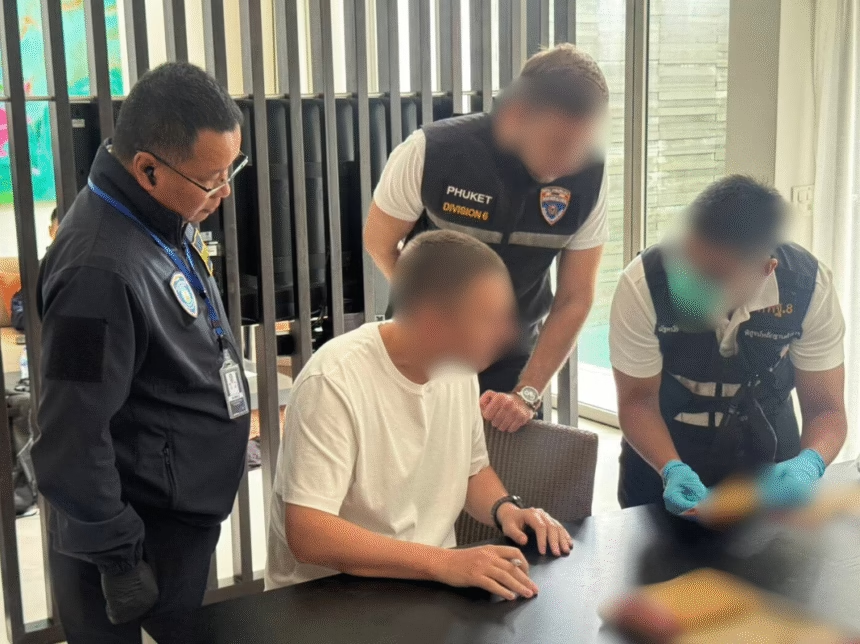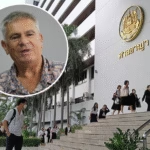PHUKET – In the heavy heat of a Thai beach resort, where tourists sip coconuts and the sea rolls in on cue, a quiet joint operation ended one man’s holiday. Thai police arrested 35-year-old Russian citizen Denis Denisenko, aka Denis Obrezko, in his hotel room in Phuket.
The coordinated raid, carried out by the FBI and Thailand’s Cyber Crime Investigation Bureau (CCIB), stripped away any sense of safety for a figure long suspected of working in Moscow’s cyber circles.
Obrezko is wanted by the United States and faces extradition on serious cybercrime charges. He is now being held under court supervision in Bangkok, his planned tropical escape replaced with legal hearings and prison cells.
The arrest reads like a scene from a crime drama. Denisenko had flown into Phuket only a week earlier and blended into the crowds along Bangla Road, with its neon lights and late-night bars. Thai officers, acting on information passed from U.S. agencies, tracked him to a high-end hotel. At first light, they moved in.
Police found a collection of digital tools that investigators believe link him to a wider campaign. Among the seized items were a laptop, a smartphone packed with secure messaging apps, and a digital wallet that may point to cryptocurrency laundering.
“This individual had previously breached security systems and attacked government agencies in both Europe and the United States,” the CCIB said in a brief statement, highlighting the seriousness of the case. Forensic experts are now examining the devices for evidence, looking for traces of attacks, stolen data, and links to known cyber operations.
The Russian Embassy in Thailand quickly acknowledged the arrest. Diplomat Ilya Ilyin told TASS that a Russian national had been “detained on suspicion of committing cybercrimes” after an “official request of the United States.”
The short response from Moscow says a lot. At a time of tense relations between Russia and Western countries, each extradition case takes on a political edge and adds pressure to already-strained ties.
Russia’s Suspected Role
At the centre of the accusations is Denisenko’s suspected role in Void Blizzard, a cyber espionage group that Microsoft Threat Intelligence (MTI) describes as a “major threat actor” supporting Russian state interests. The group is also known under the codename “Laundry Bear” in some security reports.
Void Blizzard is seen as one of the newer but more aggressive groups in Russia’s cyber toolkit. Microsoft profiled it in detail in a report published in May 2025. Unlike many ransomware crews that focus on quick cash, this group concentrates on spying and long-term access.
Its tactics are simple but effective; it uses password spraying (testing common passwords across many accounts) and stolen authentication tokens to sneak into networks without raising alarms.
Denisenko comes from Stavropol and has a background in Russian technology companies that worked on “high-tech systems for domestic industries.” That profile fits what Western investigators believe about him, a mid-tier specialist who shifted from commercial IT work into operations that serve state goals.
Although the U.S. indictment remains under seal, sources familiar with the case say prosecutors accuse him of helping breach secure networks and steal huge volumes of emails and documents for Russian intelligence purposes. MTI has previously written that once Void Blizzard gains a foothold, “they steal large amounts of emails and files,” which are then used to support information campaigns and strategic disruption.
Void Blizzard’s Track Record
Void Blizzard has built up a long list of attacks aimed at organisations seen as opponents or critics of the Kremlin. Targets have included public bodies, defence contractors, transport networks, media companies, NGOs, and healthcare services across North America and Europe.
NATO members and states that support Ukraine feature heavily in its operations, especially agencies involved in security and humanitarian work.
In one high-profile incident in 2024, the group broke into the systems of a major European transport authority. Investigators believe the hackers stole logistics data that could have revealed details of supply movements to Ukraine.
In the United States, they reportedly compromised a defence-focused think tank in the Midwest and stole confidential papers on NATO training and planning. Such material can feed Russian propaganda and military strategy.
Ukrainian civil society groups have also suffered. A breach in June 2025 at an NGO network exposed lists of donors helping humanitarian convoys. Staff later reported harassment and threats that they linked to the leak of those details.
Media organisations have not escaped attention either. A French news agency saw its internal emails taken, including private discussions over coverage of Russia. When those messages surfaced, they set off angry reactions in Moscow and added pressure on journalists reporting on the war.
Attacks on health services have raised particular concern. Void Blizzard has probed the defences of U.S. hospital systems, which experts believe may have been part of efforts to identify weak points in emergency and pandemic responses. The tactic recalls past accusations that Russia used cyber tools to influence or disrupt health and science efforts.
“These are not random stunts; this is statecraft by keystroke,” said a former FBI cyber investigator, speaking on condition of anonymity. According to MTI, the group has increased its activity since Russia invaded Ukraine, with more than 50 recorded intrusions in 2025 alone, often delivered through believable phishing emails and basic credential attacks.
Prosecutors say Denisenko helped build tools that made those operations possible. His alleged role includes writing bespoke malware and scripts that turned simple entry points into full-scale data theft. If a U.S. court convicts him on the most serious charges, he could spend decades in a high-security prison, far removed from Phuket’s beaches.
Extradition, and What Comes Next
For the FBI and its partners, the Phuket arrest counts as a major win in the effort to track and catch foreign hackers abroad. For Washington and Moscow, it is also part of a wider struggle.
Thailand has a long history of working with U.S. authorities on extradition cases and has handed over many suspects, from drug traffickers to fraudsters. Detaining a figure tied to Russian cyber interests, however, places Bangkok in a sensitive diplomatic position.
Denisenko’s legal team is expected to argue that he faces political charges and unfair treatment if sent to the United States. Thai courts will need to weigh those claims against their treaty obligations and the evidence gathered from his devices and past activity.
The process could stretch on for months, with both Russian and American officials watching closely.
If extradited, he will most likely face trial in a U.S. federal court with experience in complex cybercrime and espionage cases, such as those in Virginia. There, prosecutors would present forensic data from his seized equipment, records of past intrusions, and expert testimony from security specialists.
Void Blizzard remains active, and no single arrest is likely to shut down a group that draws on a network of programmers, operators, and intelligence officers. Still, the capture of someone believed to be directly involved in its technical work sends a clear warning to others who travel abroad while on U.S. wanted lists.
For Denisenko, the easy anonymity of Phuket is over. His case now sits at the intersection of cybersecurity, geopolitics, and criminal justice. It shows that even in a crowded beach town, far from Moscow or Washington, there are fewer safe havens for those accused of attacking Western networks.













